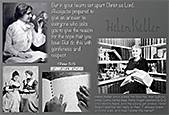
by Warren Camp
1 Peter 3:13–22 . . .
“Don’t Be Afraid to Suffer for What’s Right”
It’s important to remember to whom Peter addressed this first letter: His recipients were suffering “grief in all kinds of trials” (1:6); they endured “unjust suffering” and “beatings” (2:19–20); and they were “suffering for doing good than for doing evil” (3:17). Peter encouraged his readers by giving them a vision of “an inheritance that can never perish, spoil or fade…kept in heaven for you” (1:4). He exhorted them to “be holy in all you do” (1:15) and highlighted the vision of future rewards (1:8). Throughout his letter, he prompted them to stand fast in their faith, despite adversity.
Today’s study will call attention to a series of household codes regarding personal holiness that Peter has instructed these suffering Christians to adopt. The passage begins by addressing their relationships to other people: He’d commanded them to ”Show proper respect to everyone, love the family of believers, fear God, honor the emperor” (2:17). Then he told wives how to relate to their husbands (3:1–6) and husbands how to relate to their wives (3:7). In addition, he gave general instructions to “be like-minded, be sympathetic, love one another, be compassionate and humble” (open Warren’s commentary on 3:8–12). Peter then closed his household code segment with this supportive conviction: “but the face of the Lord is against those who do evil” (3:12).
You’re Blessed When You Suffer for Christ (3:13–14)
Peter’s opening verse follows up on his teaching to Christians on how best to live in harmony with one another (3:8). He’d told us to never seek revenge when we get harmed. Instead, we’re to do good to people who hurt or insult us (3:9). Yet, Peter now asks his readers a seemingly odd question.
13Who is going to harm you if you are eager to do good? 14But even if you should suffer for what is right, you are blessed. “Do not fear their threats; do not be frightened” [from Isaiah 8:12b] (1 Pet. 3:13–14 NIV).
Peter begins this passage by speaking guardedly about the terrible persecution coming upon fellow believers. He did not mean by this question that Christians weren’t in any danger of bodily harm from their enemies. He meant that, no matter what might happen to their bodies, nothing, really, could happen to them. Therefore, it’s believed that Peter had in mind “safety through persecution” (v. 13). When people do what’s right, they usually receive commendation (2:14). Christians should always do what’s right, even if they suffer for it. They aren’t to be fearful since nothing can take away a Christian’s blessings (v. 14). God cares for everyone who does what’s right.
Christians have experienced persecution ever since the apostles first proclaimed the message of salvation. Although we may never personally face the severity of imprisonment or death because of our beliefs, we’ve probably felt the stings of ridicule and rejection. Whatever type of harassment, we should always be prepared to suffer for Christ’s sake.
Remember: Peter wrote to believers who’d been treated harshly because of their faith. He not only felt the need to encourage them but wanted to remind them to follow Christ’s example: Though sinless, Jesus suffered in our place to bring us close to God. While the crowd at the cross mocked him, he never responded harshly. Instead, he patiently suffered, submitting fully to Father God by “entrusting himself to him who judges justly” (2:21–23). Unless we stick fast to taking his “do not fear” approach (v. 14), we could quickly descend into self-pity or angry resentment when people mistreat us. Thankfully, Peter reminds us that we’ve been blessed by being made able to suffer for the sake of righteousness. We’ll not only receive heaven’s reward (Matthew 5:11–12), but we may also have the opportunity to gently and reverently witness to others about our life-changing relationship with Jesus.
Although believers are to share the good news of salvation, the world’s hostility can make us afraid. Peter’s citing in v. 14 of Isaiah 8:12b’s text acts to encourage us not to fear, especially when harm or persecution approaches. It’s always a good idea when we respond to persecution to keep and make good use of an accurate understanding of God’s ways. Unfair suffering is sometimes a part of his plan for us, just as it was for Jesus. Assuredly, we can trust Father God, knowing that he’s fully able to prosper every situation for our good and his glory.
Our next verse starts with Peter reminding us believers to ”revere Christ as Lord.” Telling others about Jesus doesn’t require lofty words or long quotations of memorized Scripture. You must simply be ready with an answer when you’re asked about “the hope that is in you” (v. 15).
“Always Be Prepared to Give an Answer . . .” (v. 15)
Essentially, knowing God’s Word and understanding what we believe are required for our growth in Christ and our protection from deception. However, these two prerequisites aren’t the final goal. We haven’t been placed on earth merely to know for ourselves what God has already said. Instead, each of us is to share his good news about Jesus with others. In other words, “Always be prepared to give an answer to everyone who asks you to give the reason for the hope that you have” (v. 15).
That said, believers should always be ready to give an account of their motives and reasons for remaining hopeful about who Jesus is in their lives. Because of busy lifestyles, many Christians have never taken the time to think through their views and beliefs. When someone challenges them about who Christ is in their life, they tend to panic because they’re totally unprepared.
15But in your hearts revere Christ as Lord. Always be prepared to give an answer to everyone who asks you to give the reason for the hope that you have. But do this with gentleness and respect, 16keeping a clear conscience, so that those who speak maliciously against your good behavior in Christ may be ashamed of their slander (1 Pet. 3:15–16).
Peter makes two key points in v. 15: (1) We have good reasons for our hope in Christ; (2) we’re to present our reasoning to people using “gentleness and respect.” When we present to others the account for our faith, we must make a gentle, respectful delivery. It should be done with meekness, not weakness! Aggressively dumping a load of biblical truth on questioning people rarely leads anyone to God. However, a gentle answer opens hearts as well as ears. Trusting Christ isn’t religious escapism or wishful thinking. Our faith is grounded in history’s facts, including the resurrection of Jesus and the evidence of creation, which bears witness to its Creator. As we rest in God’s wisdom and the strength of his Spirit, we’re obliged to be ready to share with others our reasons for trusting our great God.
True, we must give our answer gently and respectfully. In v. 16, Peter explains why that attitude is key. First, it allows us to maintain a good conscience, being confident that we’ve not done anything harmful in what we tell others about Jesus. Secondly, those who wrongfully hurt us, despite our good behavior, should expect to feel shame when doing so. Lacking a cause to accuse us, they’ll realize their mistake of speaking maliciously against our good behavior. When our godly conduct is returned with evil, others can expect to be ashamed of their slanderous opinions about us (v. 16).
Peter will now close this passage by highlighting our suffering as well as Lord Jesus’ suffering.
Because Christ Also Suffered (vv. 17–22)
It’s incredible to think that the One who was perfectly just would die for the unjust. Pilate was correct when he said of Jesus, “I find no guilt in this man” (Luke 23:4). The charges brought against our Lord were fabricated; the witnesses were bribed; the conviction was illegal. Yet Christ triumphed through such unjust suffering by bringing us to God. And, although believers will never suffer as sin substitutes or redeemers, God may use our Christlike response to unjust suffering so we can draw others to himself.
17For it is better, if it is God’s will, to suffer for doing good than for doing evil. 18For Christ also suffered once for sins, the righteous for the unrighteous, to bring you to God. He was put to death in the body but made alive in the Spirit. 19After being made alive in the spirit, he went and made proclamation to the imprisoned spirits — 20to those who were disobedient long ago when God waited patiently in the days of Noah while the ark was being built. In it only a few people, eight in all, were saved through water, 21and this water symbolizes baptism that now saves you also — not the removal of dirt from the body but the pledge of a clear conscience toward God. It saves you by the resurrection of Jesus Christ, 22who has gone into heaven and is at God’s right hand — with angels, authorities and powers in submission to him (1 Pet. 3:17–22).
None of us wants to suffer. But if we must, it ought to happen when we do good, not evil. Sometimes, when Christians become obnoxious and offensive, they’re made to suffer for it. They might presume that they were persecuted for the sake of the gospel, when in reality they suffered for doing evil (v. 17). There is nothing masochistic about the Christian faith — nothing encourages suffering for suffering’s sake. However, suffering endured in the line of duty, “for righteousness’ sake” (v. 14) is commended. As a result, rewards are promised to those who remain faithful.
But the key to this passage could very well be Peter’s point made in v. 18a. Christ suffered once, for all of us, so that he might personally connect us with Father God. Christ came in the flesh, underwent suffering, and died in the flesh. He did all this to accomplish this great end: bringing us closer to God. Peter was reminded of the way the gospel was preached in Noah’s day and how the Spirit of Christ, speaking through Noah, preached to the people of his day to bring them to God (vv. 20–22). But those disobedient sinners denied God, just as Peter himself had denied the Christ (see photo). Peter then tells how, at the time of the flood and as a result of the preaching done then, only eight people were saved by water. This then leads to Peter’s mention of baptism (v. 21). So the ark was a depiction of the Lord Jesus Christ, carrying people over the floods of judgment, bringing them directly to God.
Having died and been resurrected to make salvation possible, Jesus then was raised into heaven at God’s right hand. Peter says herein that we must be willing to suffer for Christ’s cause and that Jesus suffered on our account to make our salvation possible. As a result, we must be willing to suffer for him when people oppose God’s will.
Peter didn’t write this ten-verse passage to scholars; he directed them toward ordinary people, then and today. His prescribed task isn’t an impossible one. However, it requires time spent reading, discussing, and studying Scriptures. When you set Christ apart as Lord of your heart, you’ll find that your time spent with him always becomes a steady joy, never a sacrifice.
- Q. 1 Have you shared the good news about Jesus with someone new this week? Why not?
- Q. 2 What’s the reason for the hope that you have?
- Q. 3 How prepared are you now to talk to nonbelievers about your faith in Jesus?
- Q. 4 What situation seemed hopeless to you until God brought hope?

‘The Last Supper’
Click to open “Peter Masterpieces.”
Summary Video: “First Peter”
† Watch this overview video of First Peter created by BibleProject.
Warren’s New “Peter Masterpieces” Photo Album
† View several classic paintings of Saint Peter by art world masters: Rembrandt, Michelangelo, Da Vinci, Rubens, Goya, El Greco, Raphael, Masaccio, Giotto, Correggio, Tintoretto, Caravaggio, Veneziano, Tissot, Duccio, Fra Angelico, Galle, Dürer, Palomino, and many more.
1 Peter 3:13–22
New International Version (NIV) or view it in a different version by clicking here.
— Listen to chapter 3, narrated by Max McLean.




